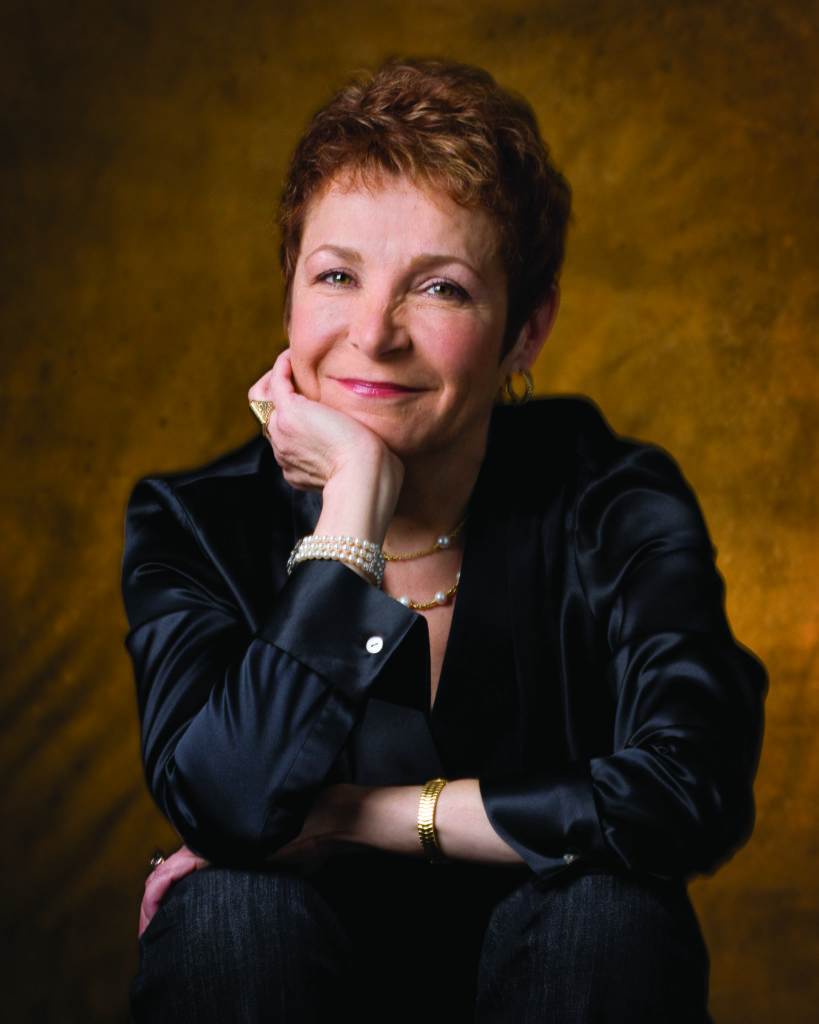
Mission of a
Modern Mystic
By ROB SIDON
Caroline Myss (pronounced “mace”) was born in Chicago in 1952 and was raised Catholic in a large Polish American family. She began accurately tapping into her unusual intuitive abilities at a very young age. At nine she inadvertently learned the extent of her father’s involvement as a marine in World War II and began a lifelong fascination with history books in order to nderstand the nature of war. At 12 she became “adultized” as an activist after hearing the torturous account of one of her classmate’s fathers, who had been held prisoner by Fidel Castro during the Bay of Pigs invasion. She studied to become a journalist and earned a master’s in theology before moving to New Hampshire to cofound Stillpoint Publishing in 1983. While working as a book editor, she earned a lasting reputation as a medical intuitive, working extensively with Dr. Norm Shealy.
In 1996 Caroline’s first book, Anatomy of the Spirit: The Seven Stages of Power and Healing, became one of her many bestsellers. Known for a unique, humorous, tell-it-like-it-is approach to mysticism, she is a popular and acclaimed speaker who is equally comfortable challenging the irrationality of Evangelicals as she is the entitlement of New Agers. She encourages people to consciously wake up to true life purpose and to generate the courage to be integral, starting by examining the significance of their smallest choices.
Common Ground: I’m told that prayer is the cornerstone of your life—that you’re constantly praying. What is prayer for you?
Caroline Myss: How did you know that? Prayer for me is an inner mystical relationship. I dwell a great deal on the graces. First of all, I’m past the stage of believing whether or not something is out there. I have a deep and abiding faith in the presence of God and the hierarchy of the order of this universe. For me, God is law. I would never say God is love. For me, God is law and order.
You don’t fantasize about a sentimental, benevolent God?
No! I have no relationship to that. I recoil just hearing of it. Because law is consistent I see only love—more deeply than anything else—in understanding God as law. Even if something happens to you and you’re crushed, it’s given in the law that after your winter will come spring. It’s like a sacred code expressed as divine promise. You are not being punished nor being abandoned. You will arise like a phoenix from the ashes even if you don’t want to. You will have to fight off joy when that symbolic spring returns to your life. That’s how transcendent mystical cosmic love shows itself, as an order of justice and consistency.
Human beings get their wires crossed because they take sentimental love and project that into a cosmic force—it doesn’t translate like that. Projecting human emotions unto a cosmic force is like trying to get a fish to understand emotional love. But I understand why people do that. We want to touch God, to find a way to make God real. And we want to protect ourselves from sudden and unexpected changes in our lives that turn our worlds upside down. For instance, when we are hit by a trauma, people often say, “There is no God” or “How could God do this?” They’re talking about human emotions and personal justice, perhaps in disappointment because their own lives fell apart. That kind of image of God cannot sustain a person and will inevitably cause a person to break from faith. With that kind of self-serving theology, you’re going to be crushed like a bug under a rug.
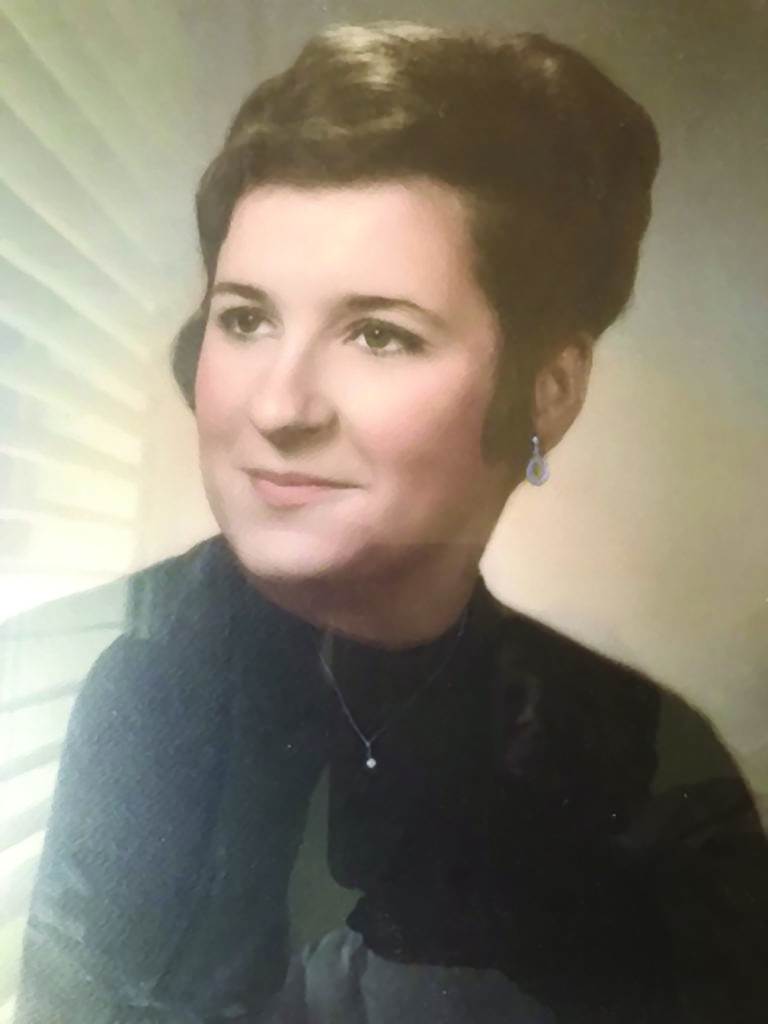
How do you distinguish petition versus prayer?
Petition is often the way people talk to God, asking for things: “God, give me this! Give me that! Can I have more of this?” It’s a very parent-child form of prayer that feeds into the mythology that there’s an off-planet God that looks like us and behaves like us. It feeds into associated parent-child mythologies that if I’m a good child, God will protect me and nothing bad will happen to me.
Even though someone becomes more intellectually savvy with age and decides “I don’t believe in God,” a core spiritual DNA belief sticks in the cell tissue, saying, “If I’m a good person, bad things are not supposed to happen to me.” Yes, divine intervention happens all the time but the great cosmic mystery is how? So the petition prayer of “I ask, I get, I sacrifice, I light candles” has long been the ritual of the first step of knocking on Heaven’s door, but it’s not the deeper way.
Why is Teresa of Ávila your patron saint?
Because I had a very profound personal experience not so many years ago that I would call a direct encounter. It took less than a second, a microsecond. I didn’t see her—it was nothing like that, but I sensed her presence and it changed my life. It completely changed my life! That was the second that I entered my mystical world and nothing has been the same. In one of her writings Teresa said, “If God gets into the walls of your soul for just a second, that’s enough for a lifetime.”
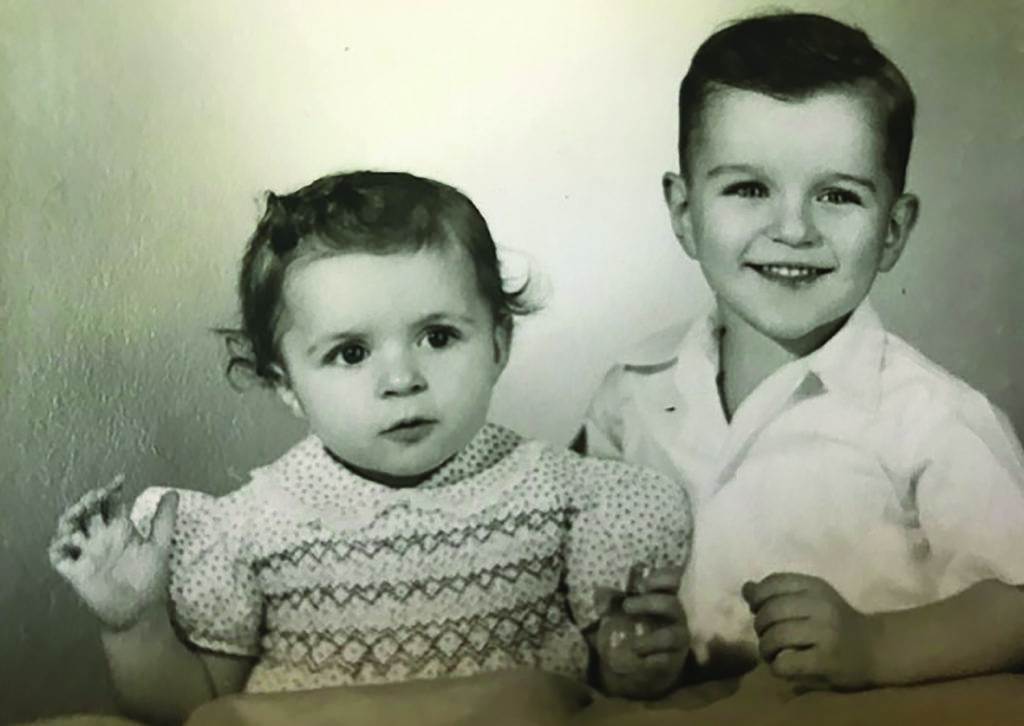
You were raised in a pious Catholic family in Chicago, correct?
I would take out the world pious but yes, I was raised in an actively Catholic family in an era where we still went to mass every morning. I went to Catholic high school, college, and graduate school. I loved every minute of it.
In centuries past do you think you would’ve been a pious nun or hunted down as a witch?
I don’t know. The fact that I don’t honor the Vatican—that’s a problem. As a child, my intuitive abilities were always popping off all over the place. Thank God my mother understood because I was doing little intuitive readings all the time, and she was wonderful about telling me to always talk to God about what Heaven wanted me to do with my gift. We’d be driving down the street as I was doing readings, and I’d say, “You know what happened in that house? Someone just died.” Or “That’s an unhappy house because of this. That’s a happy house.” I was this little psychic that couldn’t stop doing readings.
How do you have that ability?
It’s like asking an artist, “How come you see the world so beautifully in colors?” Or asking a musician, “How do you hear those notes?” It’s your wiring. In this way my Catholic background served me well. Its model of reality is extensive when it comes to the nonphysical world being close to you. It’s filled with benevolent companions called guardian angels and saints that can be reached through prayer. And miracles happen all the time. We were taught that Divine intervention was always a natural part of the sacred order—that Heaven is this close.
As a child, I would think, How can someone walk out in the world not believing anything? What is wrong with you? I always thought that skeptics were burdened with problems. That if you didn’t have a belief, you were not protected. Mind you, I am clear about mystical truths versus clinging to fundamentalist superstitions that diminish the quality of one’s mind. If you don’t know how to manage your psyche or your soul, you aren’t protected.
Aren’t protected from what?
This world is filled with psychic free radicals. In mystical language it’s filled with darkness. In another century, I would have called it demons. Anyone who speaks the language of the soul knows exactly what I’m talking about. We hold ourselves hostage on this planet with nuclear weapons threatening to kill ourselves every single minute, and you don’t think there’s evil? Are you kidding me? We have a lunatic in the White House. We consciously try to normalize gun laws that slaughter our population. People bring weapons with them to buy groceries in some states. Somebody dare tell me they don’t believe in evil? Open your eyes and see it everywhere. We have morphed to accommodate darkness.
What’s the story of you being a military historian at a very young age?
Not a military historian but I became obsessed with military history at about nine years old. My dad was a World War II marine who served in Guadalcanal and the Pacific theater. A movie came out in the 1950s called Guadalcanal Diary and it had actual footage from that battle. Television was new and I thought it was just a movie when I was watching it on TV, saying, “Dad, Guadalcanal’s on TV.” He watched and started to cry and left the room. I was devastated that I had made my dad cry. I ran crying to my mom and she said, “Oh honey, your dad was at Guadalcanal and it’s a hard memory for him.” I thought it was just a movie.
Up until that time television was just television for me. I said to my mom, “I need a book about the war.” So that’s when I started reading everything I could get my hands on about history. Anything about the war. Anything about history. I became obsessed with American history and European history. And of course all history has been formed by wars or battles or conflicts. The rest is history, as they say. My birthday is Saturday, and all the latest books about various wars and World War II spies are pouring in as gifts.
Your dad killed Japanese enemies. Didn’t your dad show you a bullet hole through a wallet or something like that?
How on earth did you hear that?
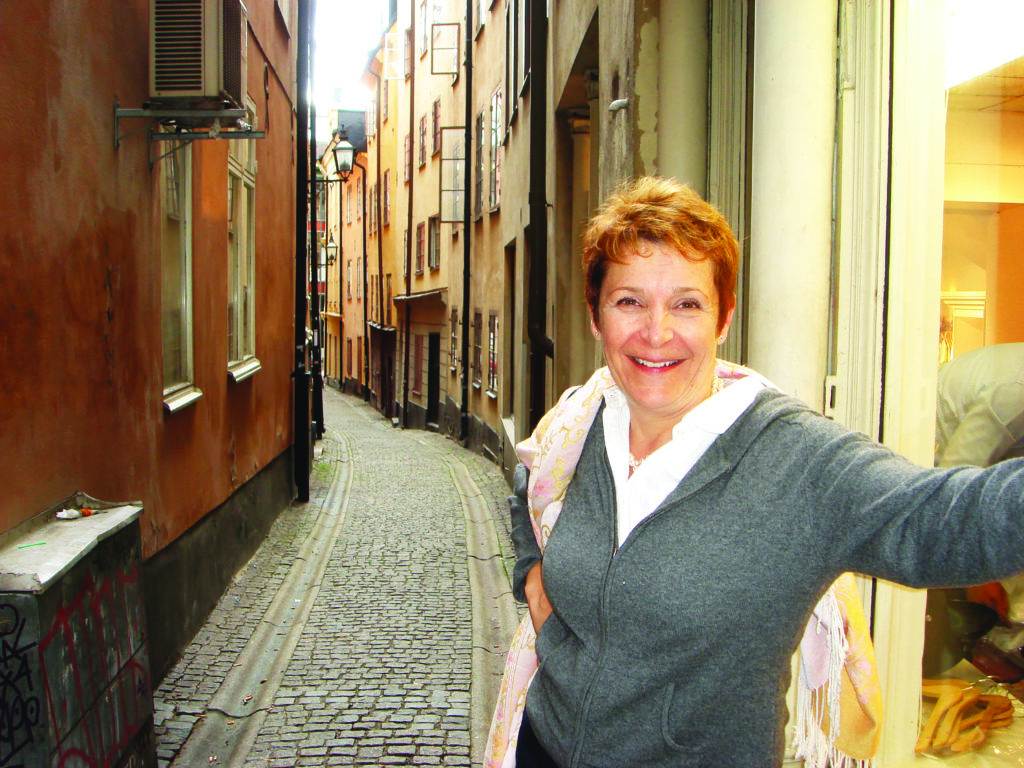
[Laughs] I did my research and found it in an obscure interview.
Yeah, this was in the late 1950s and I gave my dad a wallet for Christmas and he pulled out some Japanese money from his old wallet that had blood on it, although I didn’t know it was blood then. I said, “Daddy, what is that?” [Long pause] He said, “This is from the first human being I knowingly killed.” [Weeping] And he started to cry, and then he went up to his room. [Long pause]
Sorry to bring that up.
[Weeping] Every Christmas he prayed for those men he had shot. Even though they were the enemy, he never got over that. It impacted me too, raising questions like “What is this thing about killing? What is this thing in us?” Eighth grade was a pivotal year for me because we had an extraordinary nun, Sister Emily, who read us Victor Frankl’s Man’s Search for Meaning about being at a concentration camp at Auschwitz. She said, “This is what happened in the world. You must understand good and evil.” Back then the war had only happened 20 years before. I thought, That’s such a long time ago, this will never happen again.
That was 1963 during the Bay of Pigs, and we had some students join our eighth grade class whose families had escaped from Cuba. Sister Emily asked the father of one of the girls to speak to our class. Mister San Juan had been arrested by Fidel Castro and was 1 of 100 people who had been put into a prison cell that was meant for only 10. He said, “We couldn’t sit down. We were laying on each other to sleep. They fed us meals with cut rats.” He said, “They took us outside and lined us up 9 at a time in front of a firing squad and shot. Maybe sometimes there were bullets in there and sometimes there weren’t. It didn’t matter. Either time you died.” He said, “I know. I died nine times.”
I just sat there staring at him as though it were the live version of Man’s Search for Meaning. To this day I could describe what he looked like and thought, My God, this is still happening. Which means it could happen again. I sat there and in my gut I heard a voice that said, “Carol, it is going to happen again.” I became “adultized” in that microsecond. I became like a little soldier and thought, That’s it. I will devote my life to this not happening. What do I need to do? What do you want me to do? This cannot happen again. Yet I knew it would. I knew I would become a writer. I knew I needed to read and become a good student. That was it. That became my life.
It must’ve been brutal for you being so sensitively intuitive while integrating the awfulness of human reality.
No. What’s hard for me is dealing with injustice. I have an extraordinarily clear intuitive skill. I also have a very impersonal nature. It’s hard to describe but it’s true. I look like I’m very friendly and intimate and warm and cuddly, which I am on the outside but I’m incredibly impersonal on the inside—detached. I am not sentimental and don’t look backward. I’m an oddball that way.
You’ve never been married?
I’ve been engaged four times. Then I think, I can’t do this. I can’t do this. I’ve tried. The last time was three years ago, but as the moment got close I said, “This is not me. I can’t squeeze myself down to one person.” My wonderful world, my freedom—where I can go anywhere and be with all these wonderful people anytime. “I’m exchanging it all to be with you? You don’t make me happy enough.” [Laughs] The truth is I am not wired for marriage. I love my freedom.
[Laughs] So you were a journalist for a time. Were you the archetype of the grizzled journalist hooked on nicotine and caffeine?
Yes. I was educated during the time of Watergate and Deep Throat—Woodward and Bernstein. They were great role models that filled my head with exciting dreams. But the truth of it was, I lacked the talent and enthusiasm to be a great journalist. I didn’t have the certain type of passion that you need. What I really wanted to do was be a great novelist, a fiction writer. I had dreams about it. Heaven didn’t open up that door—yet. I still think about this piece of fiction that I want to write. Some day.
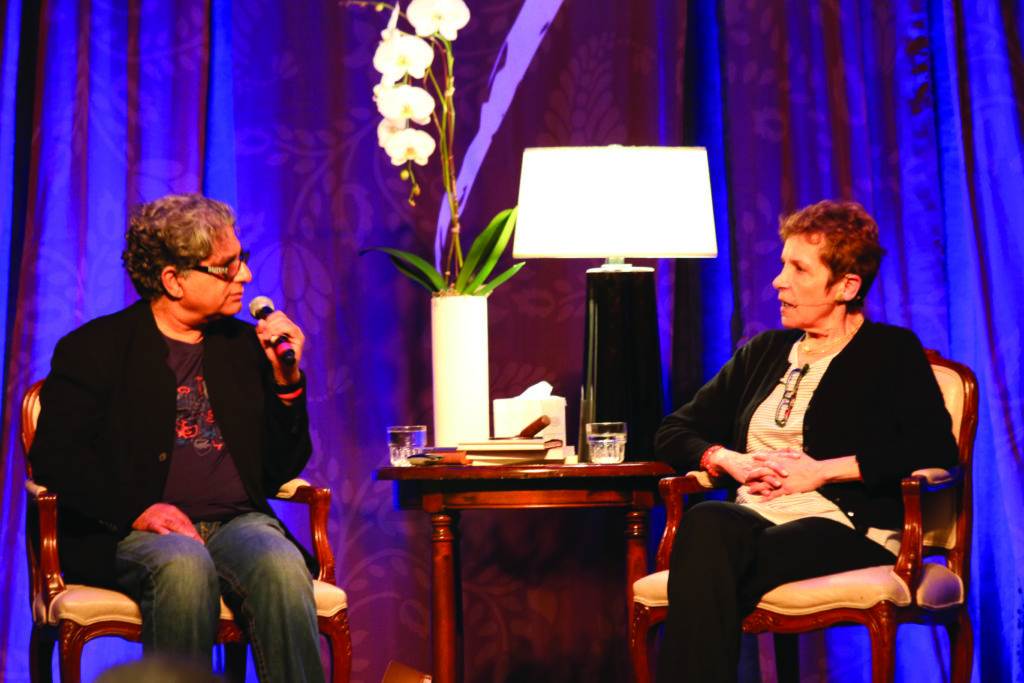
You are best known as a medical intuitive. What is a medical intuitive, and how did that come to be?
My skill as a medical intuitive emerged organically. After working as a journalist, I went to graduate school in theology from 1977 to 1979 at Loyola. Then I left Chicago in 1982 to join a married couple to start Stillpoint Publishing in Walpole, New Hampshire. One day a friend of mine was saying that a woman in a nearby neighborhood was not well. I had been in a drifty state concentrating on a manuscript and said, “She has leukemia.” She would soon get diagnosed with leukemia. The next thing you know, as those things happen, I had a hunch about this and a hunch about that. My senses were waking up and found their natural form of expression. Then it’s like a magnet or putting out honey for bears. When the neighborhood finds out that you have a skill, they want to talk to you. Then by 3:30 every afternoon at the publishing company, people were coming in for readings. That’s how it started.
You say we’re all born intuitive but that this intuition is also the source of our greatest suffering. Isn’t that counterintuitive?
No, but let me be clear about what I mean by intuitive. We’re all born with a natural gut instinct that is no different from your five senses. No different than hearing or sight. Our intuitive sensory system is part of our animal nature. It’s that part that says, I don’t think this bridge is safe. You don’t stop and think, Gee, I think that’s my intuition talking to me. You are not even conscious of that. You are simply responding to some biopsychic signal that says, This is unsafe. Let’s get out of here. This is the first stage of divine organics—they guide your survival instincts. It doesn’t matter if you’re a gambler or a drug user or if you eat cheeseburgers or cat food.
If that’s our divine biology, why do you say it’s the source of our greatest suffering?
Survival instincts are one thing. The next level is wired to your conscience—there is a distinction. Your conscience is where you start being aware of the choices you’re making. Is this right or wrong? The suffering comes at this level when you compromise your integrity. When you compromise the truth, you start getting into trouble. When your soul and all your guidance is saying, Don’t do this, and you do it anyway. When you betray yourself in a lie and you know you are lying—that act creates the seeds of true suffering. You can only betray yourself or your conscience for so long and then you either implode or take medication to repress your thinking process. This can lead to becoming an addict. You cannot sustain a healthy, high-functioning consciousness with a contaminated conscience.
You say, “Liars don’t heal.”
How can they? If the health of a system relies upon being balanced and congruent, then lying and deception do the opposite. How anybody in Washington is standing up is beyond me. But then again, as the nuns always old us, “The devil takes care of his own.” They also said, “But remember, the devil has no friends.” Bless those girls—they knew what they were talking about.
You became a medical intuitive, and all your books have been on the New York Times best-seller lists.
Most of them. I’ve been very blessed that way.
How does success affect the ol’ ego?
I think I’ve done okay keeping that in check. I have my elitist moments that usually surface if someone gets me a hotel room without an open window. After all these years on the road, I won’t tolerate a low-class hotel room, and I must have a window that opens to get fresh air. [Laughs] Is that too much to ask?
[Laughs] No. You’re not a full-on Cleopatra.
No. I don’t have the wardrobe for it! It takes a lot of effort to be demanding. I just don’t have that kind of energy.
It must be rewarding to not have to worry about money.
Well, I lived on $12,000 to $30,000 a year until I was well into my 40s, and I thought I was rich the whole time. When I lived in New Hampshire my rent was $500 a month, and I worried half the time if I could pay it. I heated my house on wood and lived quite humbly. I drove a $4,000 car. Most people own a house by that age. Then and still now I believed God was my accountant. My life changed after writing Anatomy of the Spirit.
Can you tell me briefly what Anatomy of the Spirit was about?
Anatomy of the Spirit presents the model that the human energy system has a deeper significant template that is witnessed in the seven sacraments, in the tree of life which has seven levels to it—the seven chakras. And of course now I would add the seven mansions of Teresa of Ávila. That the significance of the design of our body is part of a template with numerous and significant mystical doctrines symbolized in it. That’s what I introduced in Anatomy of the Spirit, which is still selling big.
What is Sacred Contracts about?
Sacred Contracts came as I pursued deeper questions in the readings focusing on the reasons why people weren’t healing. This opened into the world of archetypes, where I spent the next 16 years studying archetypal patterns and belief systems and their impact in the formation of people’s lives. I became fascinated with understanding, “Where does our life journey begin? What influences us? Do we have agreements or contracts that are made before this life begins?” That set off sparkles as I realized the power of these archetypical patterns that control us like marionette dolls on a stage.
This is different than life purpose, right? You’ve said, “If you have life, you have a purpose.” What does that mean?
I know what you meant, but just by this way you put your question, are you reducing life purpose to a job, a task, or an occupation?
To some extent, yeah.
I got it in your voice. That’s because the Western mind is so driven by task and having something to show for our efforts. Like, “If you don’t have a practical purpose, then what the heck are you doing?” Such a value system doesn’t embrace an understanding of the mystical purpose of life—which is the empowerment of the soul. This happens through a complex of life experiences and relationships that include an obligation to give something to life before you leave it. The true understanding of “life purpose” is to assist in the transformation of life—and nature—to make the world a better place.
To tell a Western person that their life purpose is to “learn the power of courageous choices” with all that such a statement implies. Most would walk away disappointed, unable to see through to the deeper significance of such a “cosmic assignment.” The Western person thinks, Is this going to make me money? Is it going to buy me anything? Am I going to be secure? They want to protect themselves from being humiliated in life. They want to have something to show—something where they can say, See me, see me, see me. Can you see me now?
Isn’t it our human nature to seek status—no different than in the animal kingdom? Spiritual seekers want material security too. In many cases their biggest struggle is integrating finance with a sense of purpose.
Life purpose is a mystical quest, not a physical one. Thinking of life purpose as having a guaranteed secure occupation “with purpose” is like saying if you’re unemployed, you don’t have a purpose. You can’t reduce life to an occupation. I mean you could, but you’re going to be very disappointed. The mere question “What is my purpose?” is very self-focused. Instead, consider these questions: “What am I meant to learn? What am I supposed to contribute to the whole? What am I supposed to contribute to my soul? What am I supposed to contribute to the lives of others?” Those are much deeper mystical questions.
You’re big on tamping down peoples’ grandiose sense of New Age purpose—the entitlement and exceptionalism of it all.
I think one of the reasons so many people can’t function is because they bought into that New Age Kool-Aid—that their purpose in life is to be exceptional. Who on earth fed them that stuff? Since when is your life purpose to be recognized? Who came up with that? Take Nelson Mandela—his life purpose was to inspire a nation beyond apartheid, but if someone had told him (or anyone) that beforehand he had to spend 27 years in a horrible cell and suffer abuse, torment, loneliness, and starvation in order to fulfill that life purpose, would he have said, “No problem?”
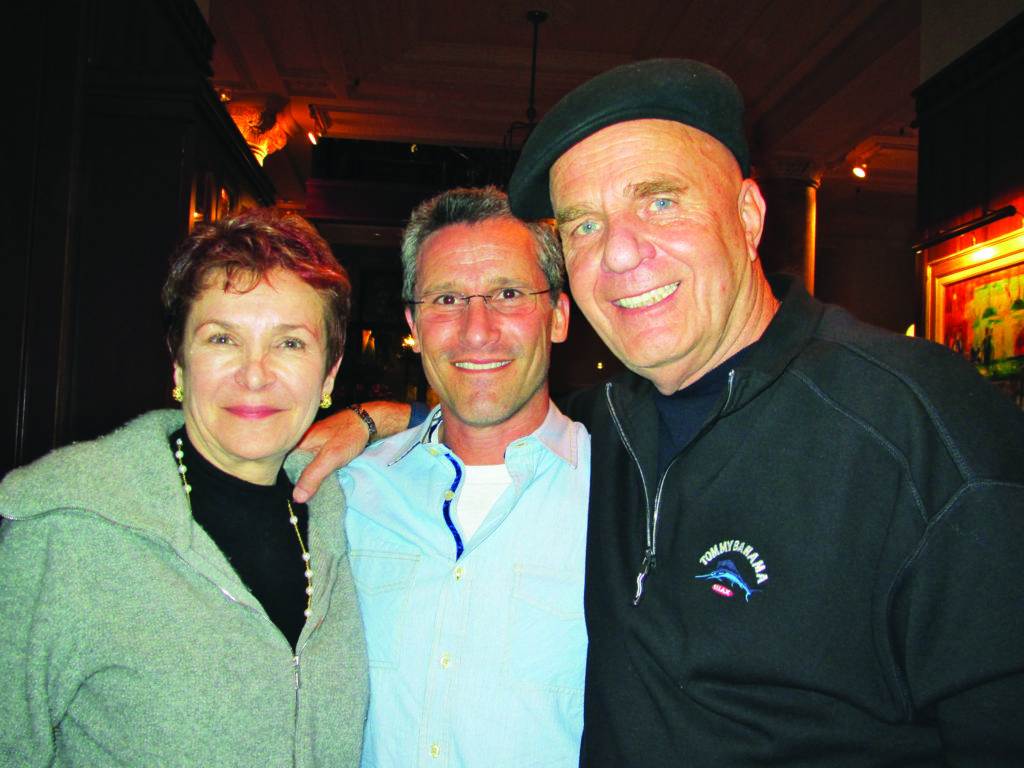
Let’s look at some of your fellow Chicagoans like Wayne Dyer or Oprah. Surely you can understand how it’s hard for people to admire them on TV and not think, Why can’t I have a similar impact?
Here’s the thing. I knew Wayne and I know Oprah and I will tell you that neither of them grew up thinking, I want to have a big impact. They didn’t grow up thinking, I want to be huge. They became huge. But being huge wasn’t their goal. That’s the difference. These days being famous is the goal for many people without any substance. Wayne and Oprah just wanted to make a difference in people’s lives. That they became celebrities through that goal was the result of their dedication, talent, and genius.
How does one know they’re on the right path?
Answer this one: Tell me when you know you’re on the wrong path.
You just feel it in the gut. It’s tough because we all accidentally make big mistakes, but the process sometimes gets rationalized afterward as, “Ouch. What a mistake! I guess I was meant to learn a lesson.”
But you know when you’re betraying yourself, right? You know when you compromise your integrity. You know when you’re lying to yourself, right?
More and more.
It’s not complicated. You know when you’re on the right path because you’re not lying to yourself. If you have to keep convincing yourself of something, then you know you’re doing something wrong. Your soul keeps you awake at night for a reason. The soul is not a quiet vessel. It screams and yells and knocks back and forth in our head and turns your stomach upside down. It may be invisible but it’s not silent. There comes a point in every adult’s life when you know whether you’re on the right path or not. Every day you have to check. It’s not a once-in-a-lifetime choice.
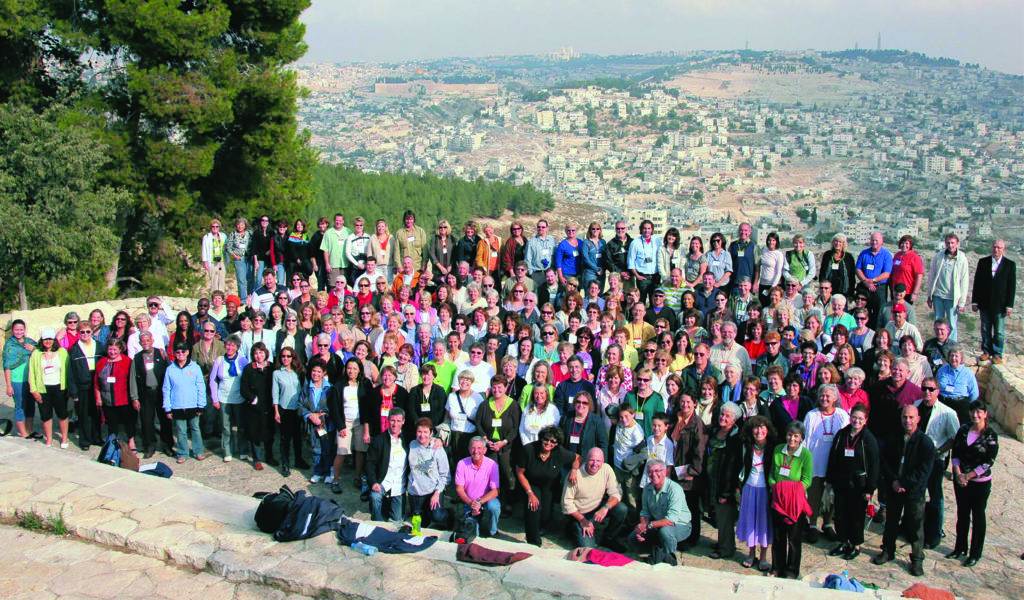
What is addiction? It seems we all answer to addiction, subtle or large. Maybe you can call these “karmic patterns,” but we all seem to make ritual mistakes.
The nature of our relationship with the physical world is addictive. I mean, I am dealing with a brutal addiction right now that I’m trying to break. It’s freaking killing me.
Can I ask what it is?
I’m addicted to honey.
[Bursts out laughing] Sorry, I’m giggling very out loud.
[Laughing] Why are you laughing? It’s not funny. I am a serious, glorified, four-star, flaming butane honey addict. A quart a month. I just went to an Ayurvedic physician. The sugar addiction is actually breaking down into arthritis and I’m prediabetic. I’m only 122 pounds.
So you know better.
[Laughing] You’re going to give me that lecture? Of course I know better! But I’m totally addicted to this stuff. I put it in my tea and keep telling myself, This is the last time. This is it. I was going to have a beehive put in my backyard—that’s how much I want honey. It’s not funny.
Why don’t people heal? There’s always some internal gnat screwing up the atmosphere—what is this chronic “chronicness”?
It’s very difficult to get the psychic human nature—the human soul—to push itself into a new pattern. It’s not just about the pattern. What you’re trying to do is push yourself up to a higher level of consciousness. It becomes about living more consciously with all of life. By challenging one pattern, you’re challenging all patterns because what is in one is in the whole.
Why do I keep putting off cleaning my messy room? Because once I clean that room I’ve got to clean them all. Then I have to do the whole house. That may be followed by I may have to knock down this house. I may realize that I don’t even want to live in this neighborhood anymore. One conscious choice doesn’t stop with that room. It’s the beginning of a series of choices, and you don’t know where they’ll end. It may take you to another country.
This is about engaging in a more responsible pattern of cause and effect—action and reaction. A conscious choice makes awareness more acute. A conscious choice makes the responses to intuitive signals sharper. It means that I will not be able to be chronic again. There is no such thing as a small or insignificant conscious choice.
What in your view is the difference between mysticism and religion?
Mysticism is the experience of God, the experience of the power of God. Religion is the politics of God and the civil or organizational laws and regulations of those politics. Religion is the manmade substance. And I do mean manmade because women did not have a hand at all in the organization of religions. So that’s one place where the word manmade literally applies.
There’s plenty of religion in America. What’s your take on Evangelicals?
They’re lunatics—especially when I hear them talking about Trump as though he’s the Messiah. If you actually ask Evangelicals a question in theology, the ideas they come up with are primitive, like creationism. Fundamentalists emerge every time a society goes through a progressive surge. They come out of the closet as a way of saying, “We’re not going forward.” They’re like the candlemakers who fought the age of electricity.
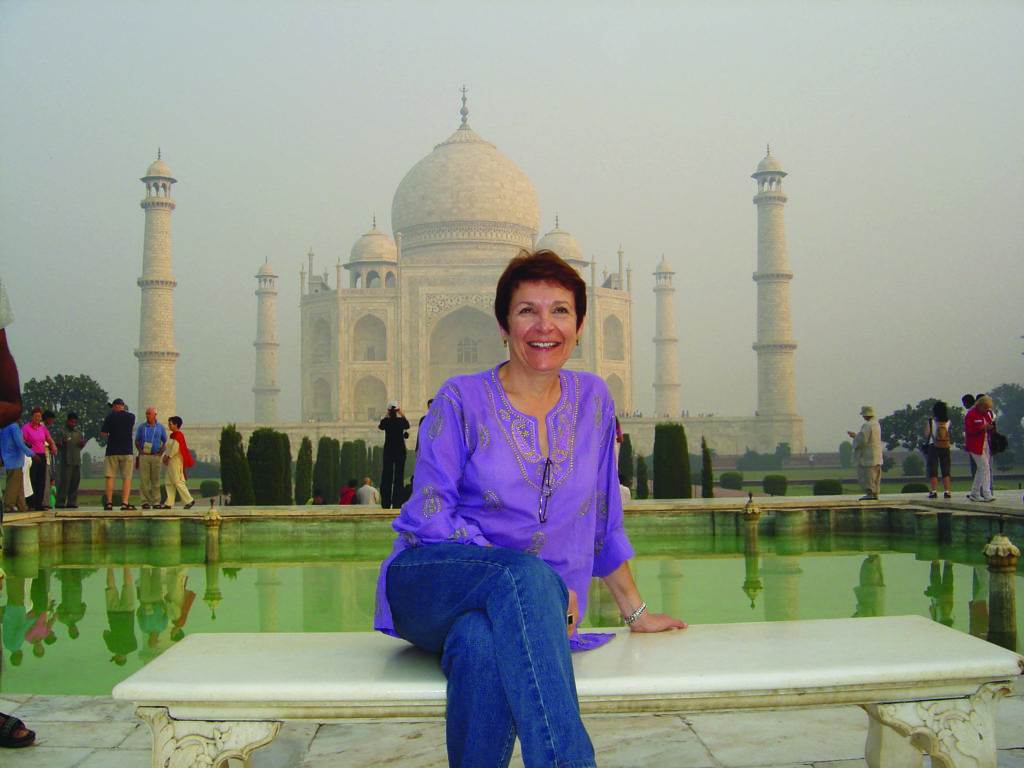
Do you believe a mystical renaissance is afoot?
I do. I see a lot of people having mystical experiences, but mystical experiences don’t manifest like they did 500 years ago with Francis of Assisi. Nobody’s going to get the stigmata today or have an angel visitation with large wings. It doesn’t happen that way anymore. Though we have evolved intellectually, the mystical path and the way of the soul remains the same, whether it is how the Hindus under stood the mystical path or the Buddhist path of enlightenment or the three stages of the Catholic mystical journey. These are long-walked revered inner paths whose stages of mystical opening remain intact. They were sacred and authentic long before we got here and will remain the same long after we’re gone.
Unfortunately, in this post-nuclear age we’ve dismantled the language of that journey, and people are unable to recognize that we’re in a spiritual crisis. We use psychological language to describe a soul crisis. We’re turning to medication to treat spiritual crises that often present as psychological depression. Medication is the last thing a person needs who is coping with a spiritual crisis.
Complete this sentence: If the soul is drawn to goodness, the ego is drawn to . . .
Power.
You’ve said that a humiliated ego is a lethal weapon.
Yes it is. Nothing is more dangerous than a humiliated ego. It seeks vengeance and absolutely wants to get even. Look at Trump. It’s been said he is ripping down Obama’s administration simply because Obama roasted him.
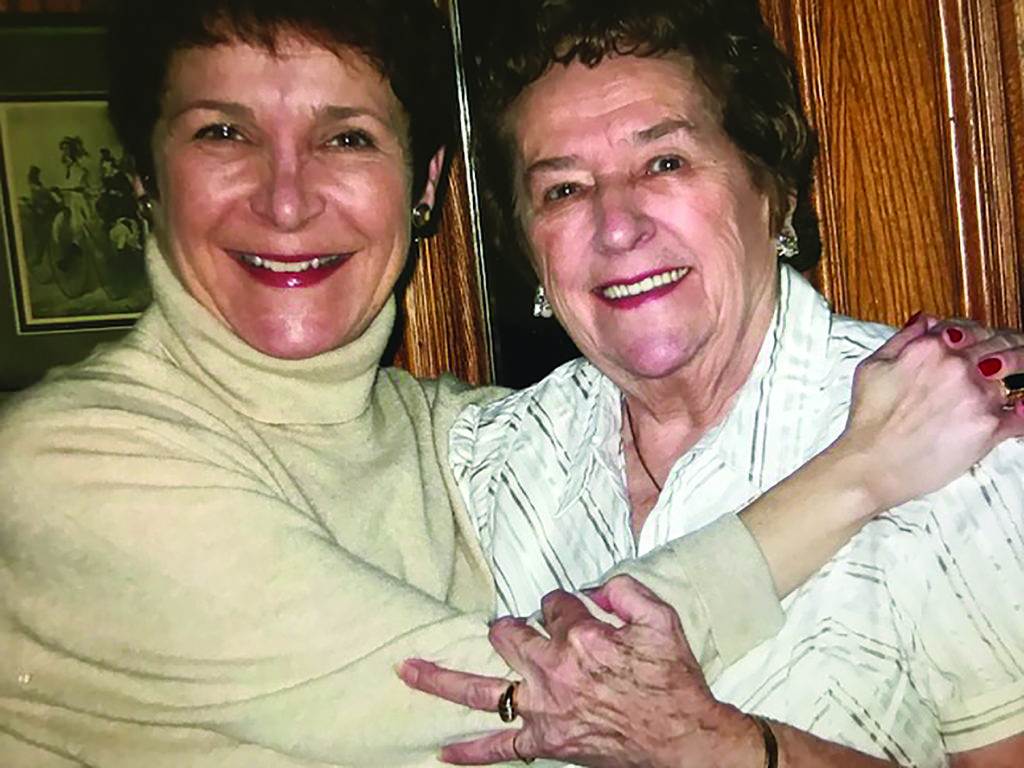
Now he’s holding nuclear codes. Do you anticipate things getting worse?
Yes I do. Much worse.
What makes you especially happy?
That I don’t feel incomplete. I don’t want to be other than who I am. I’m not looking for a purpose. I don’t want more than I have. I don’t want to do anything else than what I do. I don’t want to be anywhere else than where I am. All of that wanting I left behind me. I adore loving the people with whom I share my life. I am very grateful.
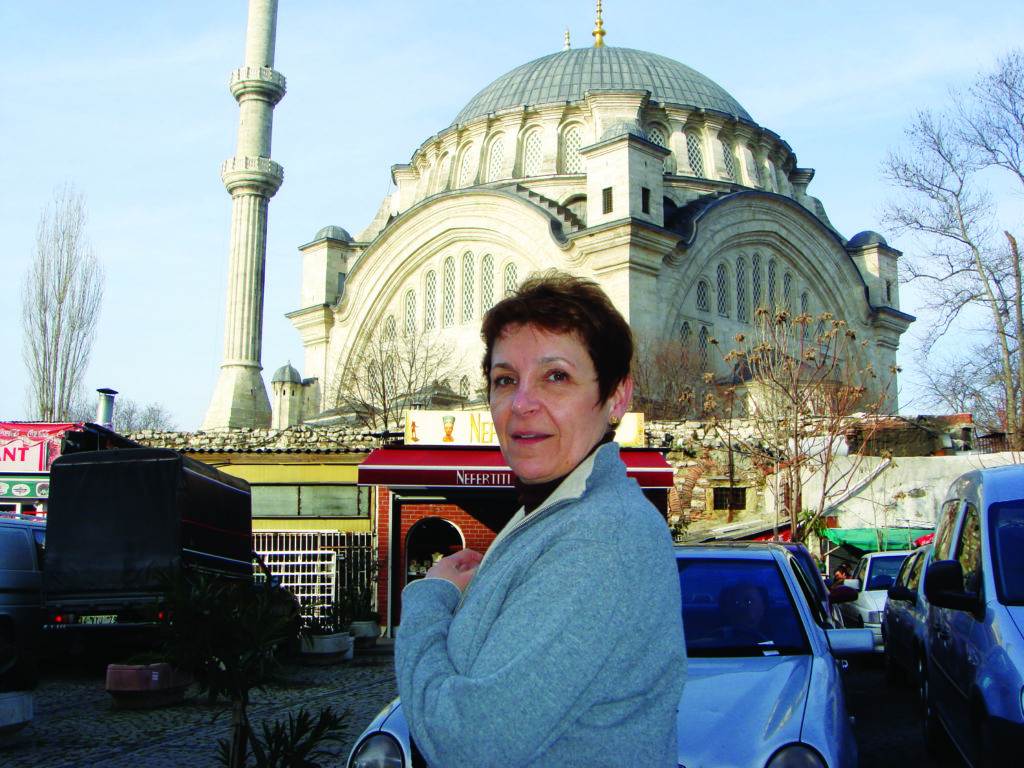
Does anything especially sadden you?
The shape of this country. It shatters me. I passed saddened, I’m into shattered.
What is your advice to Common Ground readers, most of whom are on a path or at least want to make this world a better place?
You can’t make the world a better place in your head. What’s required is action—as a person. Conversation doesn’t change a thing, though it may make you feel good over a dinner table. You have to live and breathe and be the change you want to see happen in the world. That is the true spiritual path—it’s a path of action. It’s a path of congruence, it’s a path of courage. Courage and prayer are missing ingredients. Googling and sending emails and blogging—that’s not courage. Courage is the capacity to be an integral person—to stand up for people, to take a position on things, to be an activist.
And prayer. We need to pray not just during times of emergencies. We need to pray for more than just more stuff! We need to pray for others. We are in this journey together. All life breathes together. It’s true that we can change our reality. We are at the turning point of our lives and the future of civilization. You can’t tell yourself that things will get better on their own—they won’t.
Rob Sidon is editor in chief and publisher of Common Ground.
.